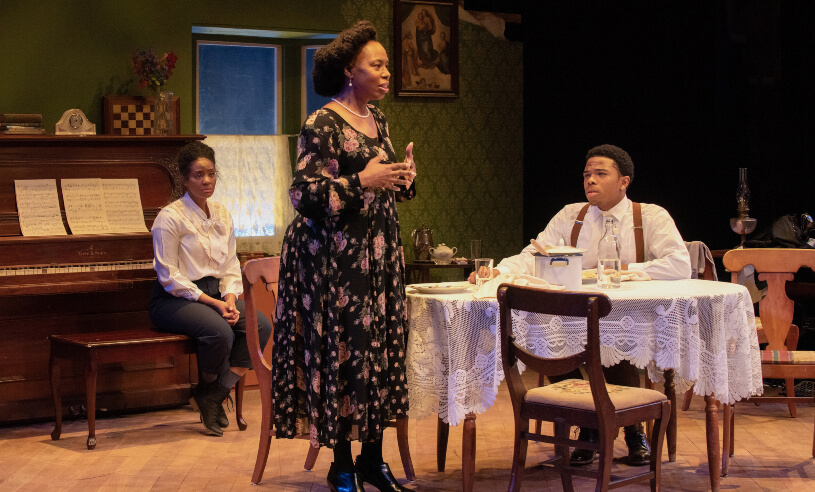See a play that made history after its debut more than 100 years ago.
Quintessence Theatre Group honors playwright Angelina Weld Grimké with their production of “Rachel”. Written as a response to the white supremacist film “Birth of a Nation”, Grimké’s play was the very first play written by an African-American author starring an all-black cast to be performed in front of an integrated audience. Its themes and lessons were more than ahead of its time, but that’s why it’s even more essential to honor Grimké’s work in 2020.
“Rachel” follows an African American family writing their own journey in the early 20th century. Set in a city in the North, protagonist Rachel Loving, who is just starting to envision a life for herself after graduating from high school, explores a path that strays away the more socially acceptable pursuits of marriage and motherhood. This is in stark contrast to their tight-knit family dynamic, with Mary (Ma) Loving as the matriarch that strengthens the family bonds. But Rachel and her family are left reeling after Ma Loving, played by actress Zuhairah McGill, reveals a terrible secret.
“Ma Loving is such a warm and beautiful character, but she has been carrying this burden for 10 years,” says McGill. “She is finally relieved of it by telling her children, but not without a domino effect.”
This part is aptly timed for McGill, after playing the role of another matriarch in “Gem of the Ocean”. She was nominated for a Barrymore Award for her portrayal of Aunt Ester during the play’s run at The Arden. There are parallels between Ester, a former slave and “soul cleanser” who welcomes those who need to be healed, and Ma Loving the seamstress supporting her family: They are strong because they are required to be, but that strength comes at a price.
“These characters are so well connected,” says McGill. “They both have significant burdens that need to be lifted in order to save people from this trauma and despair they have to go through as black people in America. This is still a struggle that we have today in 2020, so I’m really happy that Quintessence decided to do this play.”
There is no mistaking how audience members can identify themes in “Rachel” as painful and relevant today as much as they were in the early 20th century and how this reality accounts for why the theatre group chose this show to be part of its 10th season.
“‘Rachel’ is a play that is both specific to its time and chillingly prescient for our current moment,” director Alexandra Espinoza said in a press release. “Angelina Weld Grimké was a black, queer woman whose work is bursting at the seams of realism, in that the container of the play is stylistically straightforward but its underbelly is an aggressively subversive examination of what it means to be Black, to be a child, to be a woman, to be a man, to be, and stay, alive in America.”
“Rachel” runs at the Sedgwick Theater in Mt. Airy through Feb. 23. Visit QTGrep.org for more information and to purchase tickets ($20-$59). See the show for just $15 as part of Philly Theatre Week through Feb. 16.
MADELINE PRESLAND































